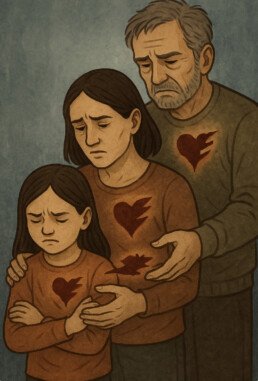Blog
Supporting Nervous System Regulation During Trauma Work:
Learning to care for the helper as well as the person being helped Working with trauma survivors is deeply meaningful, but it can also touch the helper’s nervous system in powerful ways. Regulation is not something we arrive with fully formed — it is a practice we learn over time, often through…
Finding my voice
When I was little I stopped talking. I was about 7 and l lost my voice. Not physically, there was no medical reason, no virus, disease or diagnosable cause. I could still speak when I was with a few people but for the majority of the time I was silent. It began with a stammer, difficulty in saying…
Is It Possible There Can Be Two Selves?
I was recently asked a question that landed quietly but powerfully: “Is it possible there can be two selves?” My answer came without hesitation: “Absolutely.” What follows is not theory offered from a distance, but reflection shaped through lived experience, me search, we search, research —…
Opening the door
I’ve locked you out long enough Kept you away Trying to keep you safe Warm, nowhere near my cold heart I’ve locked that door triple locked and dead bolted it so many times Combination locks where only I know the code Secure and safe Safe from me The me who let you down The me who failed you The…
When “Discipline” Becomes Harm: Understanding Cruelty Disguised as Parenting
When “Discipline” Becomes Harm: Understanding Cruelty Disguised as Parenting There is a kind of harm in childhood that many people never talk about. It doesn’t leave bruises. It doesn’t always involve shouting. Often, it was normalised. And one of the main reasons people stay silent is simple: Many…
Your Body Is Wise: And How We Frame Our Responses Shapes Everything
There’s a line that has been echoing in me ever since I read it: “Your body knows what to do. Your body is wise.” — Yuki Askew - a comment on one of my posts. It spoke to a truth I have lived, witnessed, and now teach every day. The Body Speaks Before the Mind Does There were moments in my life…
The Devouring Mother Archetype
According to Jung, the ‘Devouring Mother’ archetype, consumes her children psychologically and emotionally, preventing their independence from her (Know Your Archetypes, 2020). This mother is selfish rather than selfless. She acts as if she is protecting her children from the real world, while she…
Triangulation
Triangulation is a manipulative tactic, used to create divisions and tensions within a group dynamic (Bay, 2024). Triangulation has three distinct roles: the target, the persecutor and the rescuer (Bay, 2024). The rescuer often confuses the persecutor with the target (Bay, 2024). The persecutor is…
Resentment
Letting go of anger can be a lot harder than you realize, especially if you continue to feed your anger by hyper-focusing on negative emotions such as hostility, hate and bitterness, until your anger festers into resentment (Clinic, 2024). If your feelings of being wronged by circumstances or…
Avoidant Personality
Avoidant Personality (AVP), or Avoidant Personality Disorder as classified by the DSM- (Diagnostic and Statistical Manual of Mental Disorders, Fifth Edition), is characterized as hypersensitivity to rejection due to a deep sense of inadequacy (Fariba and Sapra, 2021). AVP can be genetic or the…




